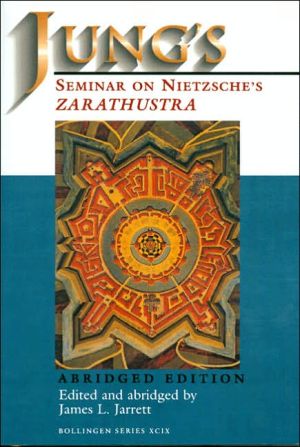

 |

|

The average rating for Jung's Seminar on Nietzsche's "Zarathustra": (Abridged edition), Vol. 99 based on 2 reviews is 4.5 stars.
Review # 1 was written on 2016-02-27 00:00:00 Philip Jones Philip JonesWittgenstein And Fin De Siecle Vienna This book is a follow-up to Janik and Toulmin's earlier study, "Wittgenstein's Vienna". Unlike the earlier book, this book consists of a series of essays which are loosely connected by some transitional passages and melded into a book. In spite of its somewhat patchwork character, this book is a good study of Vienna and the influence of its writers, psychologists, and composers on Wittgenstein. A major goal of the book is to place Wittgenstein's thought in the context of European culture and thought rather than seeing him solely within the context of the English (and American) analytical philosophy which he influenced profoundly. Of the twelve chapters in the book, the first six have little to do with an analysis of Wittgenstein's thought. Rather they consist of expositions of certain turn-of-the century Viennese thinkers. Chief of these, and probably the most fascinating figure in the book is Otto Weininger who wrote a book called "Sex and Character" at the age of 23 just before his suicide. Weininger is known as an influence on Wittgenstein. He is also remembered, when he is thought of at all, for his anti-feminism and anti-semitism. Janik attempts to capture something of the complexity of Weininger's thought by placing him in the Kantian tradition and as a practitioner of what Janik terms "critical modernism." There are also good discussions in the first half of the book of Arnold Schoenberg and, surprisingly to me, Jacques Offenbach. These composers are juxtaposed with Weininger for their critical, deflationary tendency in art and thought. They are presented as challenging the tendencies of turn-of-century Vienna towards an entertainment, theatrical culture -- shades of the present. The second half of the book deals more directly with Wittgenstein. It discusses the thought of the logical positivists, of the philosopher of science Hertz, the satirist Karl Kraus (the focus of the earlier "Wittgenstein's Vienna), Freud, and the Viennese poet Trakl. Here again, Janik does not analyze Wittgenstein's thought in detail. Instead, he takes certain broad themes suggested by Wittgenstein such as the distinction between saying and showing, "the mystical", the nature of religious experience, and the living of the everyday and shows possible sources of these themes in the thinkers he examines. The material is interesting and valuable, probably more for the light it casts on the thinkers Janik discusses than for the light it casts on Wittgenstein. This is a good, difficult book about an important creative period in the early 20th Century and about an important and difficult 20th Century philosopher. Robin Friedman |
Review # 2 was written on 2008-01-22 00:00:00 Hiroshi Kawabata Hiroshi KawabataAn interesting follow on from "Wittgenstein's Vienna" we tended to concentrate on the Tractatus and Wittgenstein's place in the Viennese mileu. This book attempts to place Wittgenstein among his contemporaries and explain their influence on him and his on them. The section on Georg Trakl is particularly interesting since it seems both shared the concept of "Ethik und Aestetik sind Eins". This volume tends to concentrate more on Wittgenstein's later work, especially the "Philosophical Investigations" and "Culture and Value". |
CAN'T FIND WHAT YOU'RE LOOKING FOR? CLICK HERE!!!